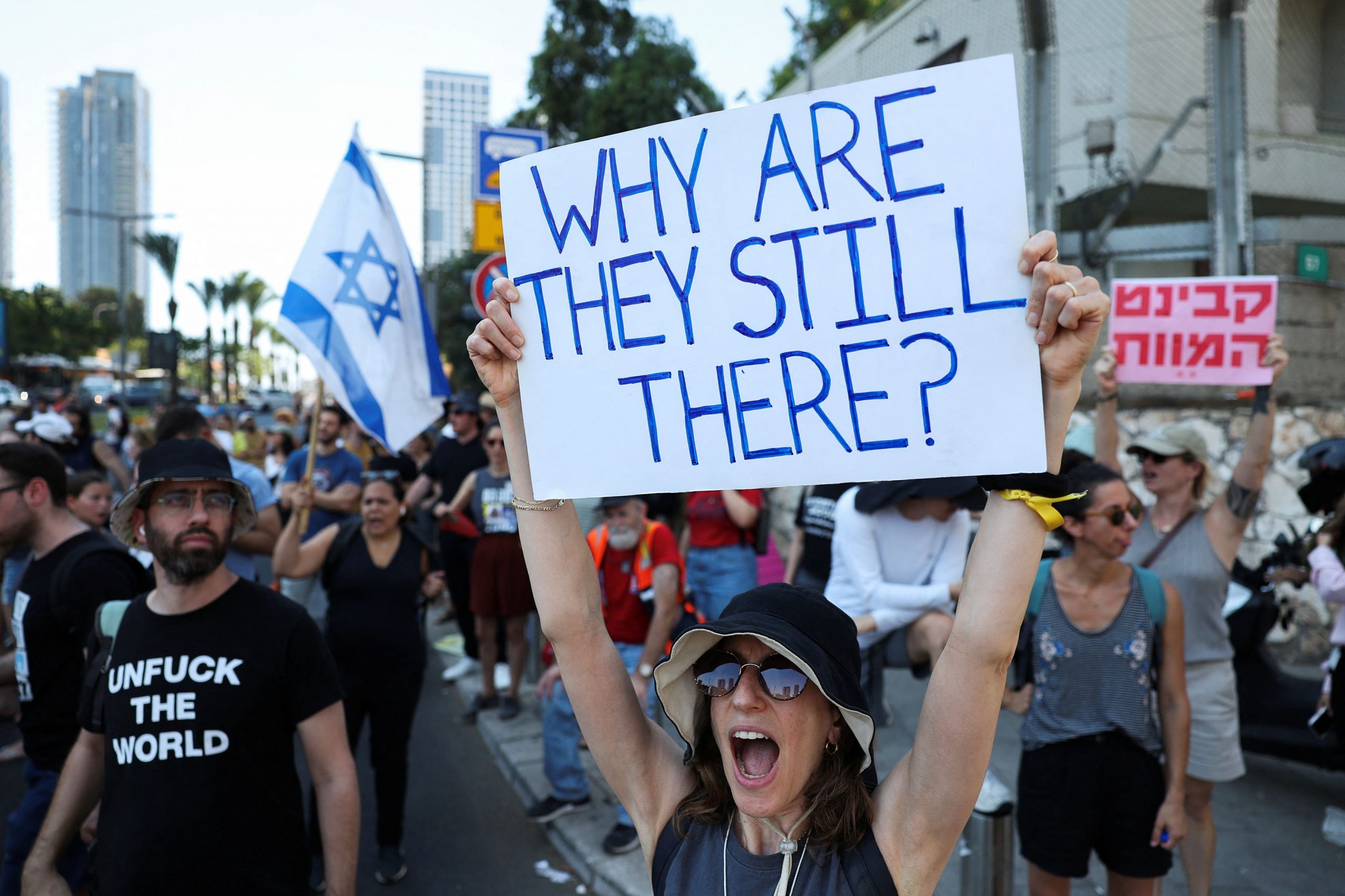TEL AVIV—Israel’s largest labor union led a nationwide strike on Monday in protest over the government’s failure to secure a hostage-release deal, after the killing by Hamas of six hostages in captivity spurred one of the largest mass demonstrations since the Oct. 7 attack that started the war in Gaza.
Furious at the government of Israeli Prime Minister Benjamin Netanyahu for failing to agree to a deal that could have saved the hostages, many Israelis said they felt the country’s leaders had condemned hostages taken by Hamas to a certain death.
Tens of thousands of Israelis marched in the streets on Sunday night in impromptu protests across the country, and four of the six hostages whose bodies were recovered on Sunday were laid to rest. The funeral of American-Israeli Hersh Goldberg-Polin, who was among those killed, is expected to draw large crowds on Monday afternoon. The hostages, who were found by the Israeli military in a tunnel in Rafah, were likely shot to death 48-72 hours before Israeli forces discovered them, the health ministry said on Sunday.
The nationwide strike has affected schools, government offices, public transportation, hospitals, banks and Ben Gurion International Airport, the country’s main airport. There were smaller protests in cities around the country on Monday.
Some municipalities refrained from participating in the strike, reflecting the deep divisions among Israelis over the war. Although polls show that most Israelis want a hostage deal in some form, there are still many right-wing Israelis who agree with the government’s position that a hostage deal should not happen if it means ending the war against Hamas.
The fury by so many seems unlikely to change the political equations at play. Netanyahu’s coalition of right-wing, ultranationalist and religious political parties have mostly supported his hard-line stance in negotiations with Hamas. The prime minister’s ultranationalist partners have also threatened to topple the government if a hostage deal means ending the war , a move that would lead to snap elections. Polls show that the current governing coalition wouldn’t be re-elected if elections happened now.
The disagreement over how to respond to the killing of the hostages has fueled political divisions that predate the current war. Before Oct. 7, Israelis were protesting for months against a plan by Netanyahu’s government to make sweeping changes to the judicial system. Those protests stopped after Oct. 7 but the hostages’ deaths have raised concerns that Israel could once again become consumed with infighting amid a devastating war with no clear end in sight.
At the protest in Tel Aviv Sunday night, many waved the same Israeli flags inscribed with the words “free in our homeland” that they had burnished during massive antigovernment protests last year.
Just like in those antigovernment protests , swaths of Israel’s tech sector have joined the latest demonstrations and are joining in on the strike.

Protesters rally together against the government and to show support for the hostages who were kidnapped during the deadly October 7 attack, amid the ongoing conflict in Gaza between Israel and Hamas, in Tel Aviv, Israel, September 2, 2024. REUTERS/Florion Goga
Dozens of major tech firms, including Wix, Monday, Lemonade and Fiverr have joined the strike, along with private companies in Israel including shopping malls and hotels.

Police use water cannon during a rally to show support for the hostages who were kidnapped during the deadly October 7 attack, amid the ongoing conflict in Gaza between Israel and Hamas, in Tel Aviv, Israel September 1, 2024. REUTERS/Tomer Appelbaum TPX IMAGES OF THE DAY. ISRAEL OUT. NO COMMERCIAL OR EDITORIAL SALES IN ISRAEL
Announcing Monday’s strike, Arnon Bar-David, the head of Israel’s largest labor union, the Histadrut, said in a press conference on Sunday that, “We are in a downward spiral and keep receiving body bags. Only a strike will shake things up.”
Bezalel Smotrich , Israel’s hard-right finance minister, responded in his own press conference on Sunday, accusing Bar-David of “fulfilling the dream of [Yahya] Sinwar,” Hamas’s leader.

Survivors of the deadly October 7 attack by Hamas on the Nova Music Festival attend a memorial a day after bodies of six hostages were discovered in Gaza, in Culver City, California, U.S., September 1, 2024. REUTERS/David Swanson
Write to Dov Lieber at dov.lieber@wsj.com





